Departmental news
Philip Leverhulme Prize success for researchers
Professor Stefano Caria has been awarded a 2022 Philip Leverhulme Prize by the Leverhulme TrustLink opens in a new window in recognition of his outstanding work and future promise.
The Philip Leverhulme Prize scheme recognises and celebrates the achievement of exceptional researchers whose work has already attracted international recognition and whose future careers are exceptionally promising.
Each prize is worth £100,000. The funds may be used for any purpose that advances the prize winner’s research.
Professor Caria studies how labour markets can trap people into poverty, with a focus on low-income countries and on experimental policy-evaluation methods.
The Leverhulme grant will enable him to embark on a new research agenda which explores how labour market decisions can decrease or foster adaptation to climate change, and evaluates interventions designed to help the poor navigate labour markets under a warming climate.
Professor Caria said:
“I am honoured and excited to receive the Philip Leverhulme Prize. This will enable me to develop a new set of field experiments exploring how to support poor individuals in climate-vulnerable countries such as Bangladesh to make labour market decisions that increase their resilience to climate change."
Professor Thiemo Fetzer is also one of this year’s winnersLink opens in a new window.
Head of Department Professor Ben Lockwood said:
“The Department is absolutely delighted by the decision of the Trust to award Philip Leverhulme Prizes to Thiemo and Stefano.
“These awards highlight the international impact that Stefano and Thiemo are already having with their work; and will enable them to continue to achieve at the very highest levels of the discipline.”
The scheme was created to commemorate the contribution to the work of the Trust made by Philip, Third Viscount Leverhulme and grandson of William Lever, the founder of the Trust.
Since its foundation in 1925, the Leverhulme Trust has provided grants and scholarships for research and education, funding research projects, fellowships, studentships, bursaries and prizes; it operates across all the academic disciplines, the intention being to support talented individuals as they realise their personal vision in research and professional training. Today, it is one of the largest all-subject providers of research funding in the UK, distributing approximately £100 million a year.
For more information about the Trust, please visit www.leverhulme.ac.ukLink opens in a new window and follow the Trust on Twitter @LeverhulmeTrust
Warwick Economics ranked 2nd in the UK for research excellence
99% of the Department of Economics' research has been rated world-leading (4*) or internationally excellent (3*) overall in the Research Excellence Framework (REF) 2021.
The REF results, released on Thursday 12 May 2022, place the Department as 2nd in the UK for overall research quality in the discipline of Economics and Econometrics, according to rankings of institutions by Grade Point Average (GPA)* published by Times Higher Education. Submissions to the REF are made by institutions and assessed by subject-level expert panels in three key areas:
- The quality of research outputs in terms of their originality, significance and rigour (accounting for 60% of the overall outcome)
- The reach and significance of research impact beyond academia (25%)
- The vitality and sustainability of the environment that supports research (15%).
The weighting of these elements forms the overall quality profile. Each area is rated as 4*, 3*, 2*, 1* or unclassified.
Key highlights from REF 2021
Outputs
- The Department ranks 3rd in the UK for quality of research output in Economics and Econometrics, according to Times Higher Education.
- 98% of the Department’s submitted research outputs are rated 4* (world-leading) or 3* (internationally excellent).
Impact
- The Department ranks 2nd for impact in the UK.
- 80% of the Department’s impact is rated 4* (outstanding) and 20% is 3* (very considerable).
The assessment was based on the submission of impact case studies, which describe specific examples of how the Department’s research has made a positive difference to the economy, society and quality of life beyond academia.
Read more and watch short videos about the impact of our work.
Environment
- The Department ranks 3rd for research environment in the UK.
- 87.5% of the Department’s environment submission is rated 4* (conducive to producing research of world-leading quality and enabling outstanding impact).
The assessment considered a wide range of factors including:
- How research is structured in the Department
- Strategies for research, impact, staffing and staff development
- Research income, infrastructure and facilities
- Collaborations and contributions to the research base, economy and society.
Find out more about our research.
Learn more about our comprehensive MRes/PhD programme.
Commenting on the results, Head of Department Professor Jeremy Smith, said: “These results reinforce our position as one of the leading departments in the UK for economics.”
“Our strong performance in the REF reflects the incredibly hard work of staff from across the whole Department in conducting and supporting the production of innovative research that pushes the boundaries of the discipline. That this research is also shaping policy as indicated by the evaluation of the impact case studies is also very gratifying.”
“We are extremely proud of this achievement and look forward to building on our strategy for developing research excellence in the coming years.”
Professor Carlo Perroni, Research Director for the Department, said: “The Department of Economics at the University of Warwick is home to a vibrant and diverse research environment that produces relevant and exciting work across all major sub-fields of economics.”
“We are proud of our researchers and of our PhD students, and we are pleased that the REF result recognises the value of what we do.”
About the REF
The REF is the system for assessing the quality of research in UK higher education institutions. It is led by the four UK higher education funding bodies: Research England, the Scottish Funding Council, the Higher Education Funding Council for Wales, and the Department for the Economy, Northern Ireland.
REF results inform the allocation of public research funding and are used in university league tables and benchmarking. The process ensures accountability for public investment in research and provides evidence of the benefits of this investment.
Notes on rankings
*Grade Point Average (GPA) is a measure of average quality of research. It is calculated by multiplying the percentage of 4* research by four, 3* research by three, 2* research by two and 1* research by one. The totals are added together and divided by 100 to give an average overall star-rating.
Dr Lory Barile is awarded Special Commendation by the Economics Network
We are proud to announce that Dr Lory Barile, Associate Professor in the Department of Economics, has been awarded with a special commendation by the Economics Network for creating written guidance for colleagues as well as an online course for students to help both groups adapt to online learning.
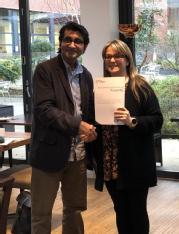 The Special Commendation award was given in recognition of special achievements by colleagues in addressing specific economics teaching challenges during the pandemic.
The Special Commendation award was given in recognition of special achievements by colleagues in addressing specific economics teaching challenges during the pandemic.
The award was presented to Dr Barile by Professor Alvin Birdi, Economics Network Director at an event at Aston University on 14 January 2022.
Details of Lory's papers and case studies can be accessed via her contributor profile on the Economics Network's website: Lory Barile.
Professor Caroline Elliott, Economics Network Deputy Director, and Professor of Economics (Teaching Focussed) in the Department of Economics commented:
"This is fantastic national recognition for Lory's work supporting students during the pandemic. Specifically, this award recognises Lory's work leading the development of resources (a Virtual Learning Environment Course for Online Learning in Economics) to support students in the move to online learning in 2020 and beyond.
Lory was a key member of the departmental team creating resources that helped colleagues with the move to online teaching and learning, and Lory recognised that students as well as staff would benefit from additional support."
We congratulate Lory on this achievement, and wish her future successes in her work to improve economics teaching and learning.
Related pages
Dr Lory Barile, Associate Professor, Director of Graduate Studies (Taught Degrees) and WP Co-ordinator.
The Economics Network - the largest academic organisation devoted to improving the teaching and learning of economics in universities.
Athena Swan Bronze Award for the Department of Economics
We are delighted to announce that the Department of Economics has achieved a Bronze Award from the Athena Swan Charter in recognition of our commitment to gender equality.
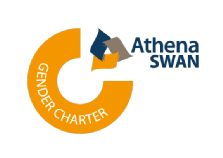 The Athena Swan Charter, now part of Advance HE, is a framework which is used across the globe to support and transform gender equality within Higher Education and research. Based on ten key principles removing barriers to equal opportunities, the recognition is awarded to institutions with outstanding work promoting gender equality.
The Athena Swan Charter, now part of Advance HE, is a framework which is used across the globe to support and transform gender equality within Higher Education and research. Based on ten key principles removing barriers to equal opportunities, the recognition is awarded to institutions with outstanding work promoting gender equality.
In 2021, the Department of Economics completed a self-assessment, led by Dr Michela Redoano and a small group of members of the Wellbeing, Equality, Diversity, and Gender Group (WEDGG), who undertook the task of gathering evidence of our recent work to embed the principles of gender balance and equality in the key areas of our work: student and staff recruitment, opportunities for professional development and progression and improving the quality of the working environment. The work of the group resulted in an application for the Athena Swan Bronze award submitted in May 2021.
The Athena Swan Submission Document outlined our strengths in some areas and recommended improvements in others, with a detailed action plan to progress our work in ensuring equality of opportunity for all and to achieve those goals outlined in our submission. One of the key priorities for us is to engage in activities to increase the representation of females in the Department which currently stands at 38 per cent of students and 30 per cent of academic staff (2020/21 data). The award is valid for 5 years until December 2026 and marks an important step in the Department’s continuing efforts to address gender equality in the field of economics.
The Department of Economics’ achievements referred to in its applications include:
- A robust action plan that builds on the self-assessment and addresses the criterion outlined in Athena Swan using SMART objectives (specific, measurable, achievable, relevant and time-based).
- Praise for identifying challenges and building on the opportunity to include outreach programmes, wider consultation work, targeted recruitment activities and the role of Advisor to Female Students.
- The development of the Department of Education 'work for us' webpage, signposting applicants to flexible working procedures and University support networks.
Dr Michela Redoano, speaking for the Department of Economics Self-Assessment Team, said:
“We are delighted to have been successful in achieving our Bronze award. This was a team effort which helped us to identify and address some of the barriers we faced when tackling gender equality and it will underpin our future work in implementing the Athena Swan Action Plan. We’ve already started the work on embedding the plan into all of our activities.”
Commenting on the award, the Head of Department, Professor Jeremy Smith said:
“We are very proud of this achievement which marks a significant progress in our work on gender equality in recent years. Thank you to the Self-Assessment Team who have worked extremely hard to make it happen. Our work in this area will continue and progress further in the coming months and years, as part of the Athena Swan Action Plan.”
Related Resources
Economics ranked 2nd in the Good University Guide 2022
The Department is proud to announce that Economics at Warwick has been ranked 2nd out of 74 departments in the specialist subject table for Economics in the Times and The Sunday Times Good University Guide 2022.
The Good University Guide, published annually by the Times and the Sunday Times at the start of the academic year, provides British university rankings based on five categories: teaching quality, student experience, research quality, entry points and graduate prospects. We are particularly pleased to see Economics at Warwick achieving a high score of 95 per cent for graduate prospects and a total score of 98 per cent placing us 2nd behind the London School of Economics.
This latest news follows on from our success earlier in the year in The Complete University Guide 2022 league table where we were ranked 3rd and in The Guardian’s best UK Universities 2022 table we were placed 6th. In the QS World University Rankings for Economics and Econometrics we are currently ranked 25th.
Professor Jeremy Smith, Head of Department of Economics, said:
“I am delighted to see that we have been recognised again for the top quality of our research and teaching and particularly for preparing our students very well for the job market. It is particularly pleasing to note this recognition in the times when we have had to work extremely hard to maintain the high quality of teaching despite the challenges placed upon us due to the pandemic.
I’d like to take this opportunity to thank all the staff and students of the Department for their dedication and hard work which have contributed to this success.”
As the Good University Guide 2022 has also recognised the University of Warwick the University of the Year for Teaching Quality and a runner-up for University of the Year, we are joining in celebrating with the University another significant success.
Find out more:
- The Times and The Sunday Times Good University Guide 2022 (The Times subscription is required to view it)
- The Complete University Guide 2022 ranked Economics 3rd
- The Guardian’s best UK Universities 2022 ranked Warwick Economics 6th
- We are currently ranked 25th for Economics and Econometrics in the QS World University Rankings for Economics and Econometrics, published in 2021.
- Warwick named University of the Year for Teaching Quality - press release 17 September 2021
Marina Halac awarded Elaine Bennett Research Prize
Warwick Economics Associate Professor, Marina Halac, has been awarded this year's prize for her outstanding contributions as a young woman in the economics profession.
Professor Halac will formally accept the prize at the Business Meeting and Award Ceremony of the American Economic Association (AEA) Committee on the Status of Women in the Economics Profession (CSWEP), on 7 January 2017 in Chicago.
The Elaine Bennett Research Prize is given in memory of Elaine Bennett, who made significant contributions to economic theory and experimental economics during her short professional career, and who mentorerd many women economists at the start of their careers. The prize was established in 1998 and recognises and honours outstanding research in any field of economics by women not more than seven years beyond their PhD.
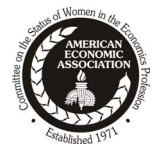 Marina received her PhD in Economics from the University of California, Berkeley in 2009 and currently serves on the editorial boards of two journals. The AEA described her work as 'exemplary', having five papers in top five journals. Her work is well-cited and influential and she has been described as an "award-winning teacher, a noted provider of public goods, and a spectacular colleague, who is much in demand as a speaker at seminars and conferences".
Marina received her PhD in Economics from the University of California, Berkeley in 2009 and currently serves on the editorial boards of two journals. The AEA described her work as 'exemplary', having five papers in top five journals. Her work is well-cited and influential and she has been described as an "award-winning teacher, a noted provider of public goods, and a spectacular colleague, who is much in demand as a speaker at seminars and conferences".
Marina was recognised for her impressive contributions to microeconomics theory, and to our understanding of dynamic incentives and agency problems. Her research in contract theory and game theory focusses on how incentives are shaped by the information environment. She has developed theoretical models to study issues such as the structure and dynamics of employment relationships, the problem of how to motivate experimentation and innovation, and the design of fiscal rules to constrain government spending.

This is a huge honour for me, especially to be joining the outstanding group of women that received this prize in the past.
Previous winners of the prize are: Emi Nakamura (Columbia University), Anna Mikusheva (MIT), Erica Field (Duke University), Amy Finkelstein (MIT), Monika Piazzesi (Stanford University), Marianne Bertrand (University of Chicago), Esther Duflo (MIT), Susan Athey (Stanford University) and Judith Chevalier (Yale University).
related: https://www.aeaweb.org/about-aea/committees/cswep/awards/bennett
author: ecsmbm
Economics Professor, James Fenske awarded the Wiley Prize in Economics
The prize, sponsored by Wiley is worth £5,000 and is awarded annually for achievement in research by an outstanding early career economist.
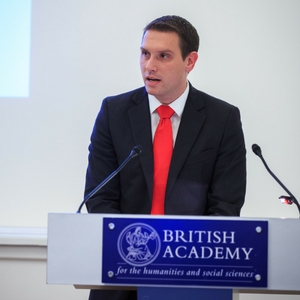
Professor James Fenske was named by the British Academy and Wiley as the winner of this year’s prize for his academic excellence in the field of economic history, in particular the quantitative economic history of Africa.
Nominations can be for research in any field of economics or economic history, and are made by Heads of Department of Economics (or equivalent) in UK HE institutions.
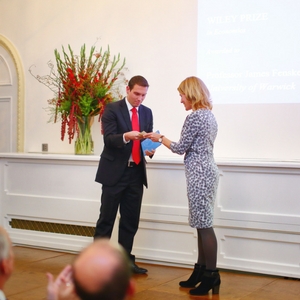
Previous award winners include Dr Johannes Spinnewijn from the London School of Economics and Political Science (2015), Dr Vasco Carvalho from the University of Cambridge (2014) and Professor Phillip Kircher from the University of Edinburgh (2013).
Further details of the awards can be found on the British Academy website.
related: http://www.britac.ac.uk/prizes-and-medals
Economics undergraduate, Adam Brzezinski, nominated for IAES 'Best Undergraduate Paper' Competition
Adam, who graduated this summer with a First Class BSc (Econ) degree has been selected as one of the four finalists for this year's International Atlantic Economic Society for the Best Undergraduate Paper Competition.
The international Atlantic Economic Society have announced the finalists for their 12th Annual competition and have invited students to present their work at the 82nd International Atlantic Conference in Washington DC on the 15th October 2016. The winner of this prestigious competition will receive a cash prize and will have their paper printed in the upcoming issue of the Atlantic Economic Journal, with the other three finalists invited to have an 800 word abstract of their paper published. All finalists will receive a commemorative plaque to mark their accomplishment.
Adam's paper was the product of his third year Research in Applied Economics (RAE) project, entitled 'Synergies in Labour Market Institutions - The nonlinear effect of minimum wages on youth employment' which he completed under the supervision of Dr. Piotr Jelonek. The other finalists include students at the University of Virgina and at the University of Pennsylvania.
Last year, the department saw graduates Hameem Raees Chowdury, and Virginia Minni present their papers at the final stage of the IAES competition, with Hameem going on to win first place. Moreover, earlier this year, three Economics students, Mihlay Abel, Michael Gill and JJ Lim presented their RAE papers at the prestigious Carroll Round Conference, at Georgetown University, with Mihlay bringing home the award for 'outstanding participant'.

We are delighted to hear that, year after year, Warwick Economics students have excelled at major international conferences of undergraduate research. Many congratulations to Adam for keeping up the Warwick tradition! We wish him the best of luck for his presentation at the final stage of the IAES competition.
related: http://www.iaes.org/best-undergraduate-paper-award/, http://www2.warwick.ac.uk/fac/soc/economics/news/2015/7/undergraduate_students_present_papers_at_us_conference/, http://www2.warwick.ac.uk/fac/soc/economics/news/2015/10/warwick_economics_student_wins_best_undergraduate_paper_award/
New study suggests women do ask for pay rises but don't get them
New research from Cass Business School, the University of Warwick and the University of Wisconsin shows that women ask for wage rises just as often as men, but men are 25 per cent more likely to get a raise when they ask.
Using a randomly chosen sample of 4,600 workers across more than 800 employers, the research is the first to do a statistical test of the idea that women get paid less because they are not as pushy as men. The researchers found no support for the theory.
The authors of the study Do Women Ask? also examined the claim that female employees hold back for fear of upsetting their boss, and again found no evidence for this theory either.

We didn't know how the numbers would come out. Having seen these findings, I think we have to accept that there is some element of pure discrimination against women.
Various ideas have previously been suggested as to why women might be reluctant to ask for an increase in their pay packet. These include: women don't want to deviate from a perceived female stereotype, and they may fear being less popular at work.
Ours is the first proper test of the reticent-female theory, and the evidence doesn't stand up.
When like-for-like men and women were compared, the men were a quarter more likely to be successful, obtaining a pay increase 20 per cent of the time. Only 16 per cent of females were successful when they asked.
The research uses data gathered in the Australian Workplace Relations Survey (AWRS) which covers the period 2013-14 which is a representative sample of Australian employees and workplaces.
We realised that Australia was the natural test bed, because it is the only country in the world to collect systematic information on whether employees have asked for a rise.
The survey has the distinctive feature that it asks individuals a set of questions about whether their pay is set by negotiation with the company, whether they have successfully obtained a wage rise since joining the employer, whether they preferred not to attempt to negotiate a pay rise because they were concerned about their relationships, why they decided that, and about their levels of job satisfaction.
Using statistical methods, the authors' analysis shows that it is crucial to adjust for the number of hours worked (because part-time workers feel hesitant to 'ask'). The analysis also took into account the nature of the employer, the industry, and the characteristics and qualifications of workers.
Despite the dispiriting findings, the authors pinpointed one encouraging sign in the data - young Australian female employees get pay hikes just as often as young Australian men.

This study potentially has an upside. Young women today are negotiating their pay and conditions more successfully than older females, and perhaps that will continue as they become more senior.
The research is a collaboration between the University of Warwick, Cass Business School, City, University of London and the University of Wisconsin at Oshkosh, USA.
Amanda Goodall can be contacted at E: amanda dot goodall dot 1 at city dot ac dot uk M: +44 (0) 7962 211317 W: http://www.amandagoodall.com
The paper can be downloaded here: Do Women Ask?
author: ecscb
Professor Mike Waterson's secondary ticketing review published by the Government
The Government has published an independent report by Warwick Department of Economics Professor Mike Waterson into the consumer protection measures concerning online secondary ticketing facilities. Professor Waterson was appointed to write the report by the Secretaries of State for Business, Innovation and Skills and Culture, Media and Sport.
Professor Waterson led the independent review which sought to assess the effectiveness of consumer protection measures applicable to sellers and purchasers of tickets for music, sporting and cultural events in the UK. It also aimed to identify any problems for consumers and potential ways to address them.
The report was commissioned after the Consumer Rights Act 2015 placed a statutory duty on the Secretary of State “to review, or arrange for a review of, consumer protection measures applying to the re-sale of tickets for recreational, sporting or cultural events in the UK through secondary ticketing facilities.
Professor Waterson said;
“This review was challenging, and a lot of work, although I had the assistance of a team of civil servants. I met many interesting people, with very differing views. I managed to get some economics into it, but also had to think seriously about questions of implementation, which are less often considered by economists.”
Some of the main recommendations set out in the report are:
· Secondary ticketing platforms should ensure that sellers on their platforms fully observe the rules set out in the Consumer Rights Act – this means including information such as the face value of the ticket and the exact seat location, and any restrictions on the user of the ticket (e.g. age).
· Primary ticket vendors should guard against the possibility of mass purchase by individuals who have no intention of attending the event.
· Primary market players need to increase transparency and come together to standardise the way in which information on the range of available ticket outlets and clear pricing information is made available to the public.
Baroness Neville Rolfe said;
I would like to thank Professor Waterson for completing this review. Through his hard work, we have gained a better understanding of the ticketing market. This is a topic that attracts great interest and a wide range of views, so an independent voice is a welcome contribution. We will respond to this report in due course.
You can read the full report here.
author: ecrbh
